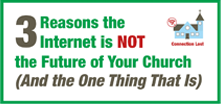Three Reasons the Internet is NOT the Future of Your Church (And the One Thing That Is)

 COVID-19 has forced most churches around the globe to approach ministry in a totally different way.
COVID-19 has forced most churches around the globe to approach ministry in a totally different way.
While some churches already had a strong online presence, building closures due to the pandemic forced many churches to scramble to figure out how to connect with their congregations remotely.
Whether through Facebook Live, Zoom, YouTube, or other media form, digital ministry has become the “new normal” during these unprecedented times.
While digital communication isn’t going away (much like COVID-19, unfortunately), and it can be an excellent tool, we need to be careful just how much we rely on the Internet as the future of the church.
1) The Internet is not foolproof.
Software glitches and internet issues have prevented many a message from being broadcast on Sunday mornings. In fact, a widespread internet outage prevented my own large church from being able to broadcast properly in the process of writing this very article.
How many missed Sundays before a thirsty soul finds a different church, or worse, leaves the faith altogether for lack of consistency during a time of uncertainty?
On a more global scale, some day a bored 14-year-old, terrorist organization, or anti-west foreign government may figure out how to take down the entire internet, power grid or both.
What then?
All the fancy streaming and technology in the world won't mean much.
2) The Internet (and social media access) is not guaranteed.
In an increasingly divided nation that has adopted “cancel culture”, churches who think "Online church is the future!" will be deeply disappointed when (not if) social media and video sharing networks decide what we have to say is "hate speech" and their online church gets blocked from posting videos on those platforms.
This should be no surprise, as Jesus himself said “If the world hates you, keep in mind that it hated me first…If they persecuted me, they will persecute you also.” John 15:18, 20
3) The Internet is not healthy as a long-term strategy.
Even if our technology remains reliable and the social media networks never ban churches or their message, heavy social media/online usage still isn't all that great for our mental health.
In fact, heavy users of social media are 3 times more likely to suffer from depression and anxiety compared to occasional users of social media.
If online relationships and community were the future, then the people at the forefront of that movement (heavy users) would be the most emotionally healthy people in our society, not some of the worst off. (For more on social media and mental health, see this article: https://www.psychologytoday.com/us/blog/talking-about-men/202002/social-media-and-mental-health-time-digital-detox )
- - - - - - - - - - - - - - - - - - - - - - - - - - - - -
Does all of this mean your church shouldn't use social media or the Internet?
Definitely not!
There's nothing wrong with appropriately using the tools available to move your church through this challenging time while also helping move people (safely, of course) towards your ultimate goal.
But what is your ultimate goal?
How are you measuring your success as a church during COVID-19?
We can’t measure our churches’ success by “views per video” any more than we could measure success in person by bodies in the seats before this pandemic.
The most significant reason why the internet is not the future of your church is because it lacks the most important ingredient in a true Christian community
Ultimately, the only thing that will matter in the future is the only thing that (should have) mattered all along: engagement.
Just look at the early church.
They devoted themselves to the apostles’ teaching and to fellowship, to the breaking of bread and to prayer. Everyone was filled with awe at the many wonders and signs performed by the apostles. All the believers were together and had everything in common. They sold property and possessions to give to anyone who had need. Every day they continued to meet together in the temple courts. They broke bread in their homes and ate together with glad and sincere hearts, praising God and enjoying the favor of all the people. And the Lord added to their number daily those who were being saved. Acts 2:42-47 (Emphasis added.)
The kind of community described in this passage can only happen through in-person interactions.
Think about it.
When a couple welcomes a new baby…*The internet church leaves emojis and congratulations.
*The engaged local church organizes a meal train and leaves hot food on that family’s doorstep. They may even arrange for help with childcare of the family’s other children or housecleaning during the adjustment period.
When a widow has surgery…
*The internet church sends thoughts and prayers.
*The engaged local church members bring food, run errands, and clean her house as she recovers.
When the church building needs repair…
*The internet church sends money or items off an Amazon wish list.
*The engaged local church assembles a group of volunteers to roll up their sleeves and labor together.
In these examples and countless more, there nothing wrong with how the internet church responds.
Those responses can be blessings, too!
But the impact of the engaged local church is so much greater!!
The relationships that exist only through a screen are no match for the relationships that are deepened and the way people come to know and be known in those times of serving one another and working together as the body of Christ.
When trust is built in these more personal relationships, that’s where the magic happens.
This is where we have more influence with each other and real discipleship can take place.
So how do we gauge our engagement successes, or even determine if the opportunity exists?
Here are a few questions to get you started:
*How many people are known and actively part of discipleship in your church community?
*Are they connected to a local group of people that can spend time with them and "do life" together?
*If your church lost all access to power and technology, would your people still have somewhere to go at some certain time in order to find community and continue growing their faith?
- - - - - - - - - - - - - - - - - - - - - - - - - - - - -
Of course, we need to keep safety in mind as we go about engaging our communities.
You’re encouraged to follow local and state COVID-19 safety guidelines as you go about finding creative ways to stay connected to others during this time.
But as we are all in this season of pivoting how we minister to our congregations, let’s keep in mind that sermon views and “likes” on our socials are not the goal, even when the majority of our ministry is happening online.
The Internet is NOT the future of the church…but engagement is.
- - - - - - - - - - - - - - - - - - - - - - - - - - - - -
We’d love to hear from you! How have you kept your congregation truly engaged during this season?




